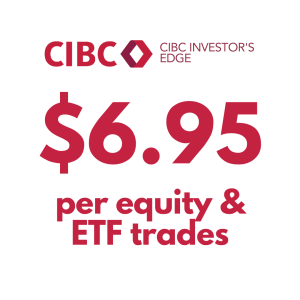
Self employed individuals run their own businesses, stimulate the gig economy, and add a personal touch to the Canadian marketplace! Without them, we might not have the unique and dynamic products and services we have today. Although, self employed people of Canada definitely feel the effects of more burdens – mainly from a tax and administrative perspective. Much more tracking of the ins and outs of money is necessary when self employed. The silver lining is there are tons of self employed tax deductions in Canada. But if you don’t know what they are, you can’t track and take advantage of them.

Table of contents
Below, we will explore what self employed means and provide details about the tax deductions available to you in Canada. By the end of this article, we hope you can reduce your tax payable!
CIBC Investor’s Line Offer
Up to $6.95 per online stock or ETF trade. Plus, there’s no minimum account balance.
What does self employed mean?
Self employed means someone owns and operates a sole proprietorship. Often referred to as persons who “work for themselves.” They have their own clientele, provide products and/or services, and manage their own business expenses. There are many varieties of self employed people, such as freelancers and small business owners. Plus, those who earn an income independently from an employer or other business entity.
It’s important to note that self employed people are not the same as incorporated businesses. Rather, they have a sole proprietorship business structure. This is important to note because it impacts the individual’s tax situation. A self employed individual reports their business income and expenses on a personal tax return. Whereas a corporation completes a corporate tax return. The taxation of a sole proprietorship and corporation is very different. In this article, we’ll be covering tax deductions for self employed and sole proprietorships, not corporations.
Related Reading: What to Know About Being Self Employed
How much tax is deducted from self-employed income in Canada?
Generally speaking, self employed individuals always receive gross income. In other words, self employed people do not benefit from source tax deductions. This can be a learning curve for newly self employed people because their employer likely deducted and remitted income taxes on their behalf in the past. In this instance, the employee’s tax liability will be much lower when they file their taxes because they’ve already paid a substantial chunk of the total. But for self employed individuals, the entire balance is due at tax time which can be shocking if you’re used to your employer doing the work on the back end.
When self employed, saving and preparing for tax payments becomes your responsibility. It’s a good idea to set aside roughly one third of what you earn for tax purposes because it will become due in a lump sum during tax season.
CIBC Investor’s Line Offer
Up to $6.95 per online stock or ETF trade. Plus, there’s no minimum account balance.
Although, the greatest benefit of the self employed lifestyle is you can deduct business expenses from your self employment income. Taxation happens on your net income, not gross income. For this reason, one third of your income may not be an accurate reflection of what you’ll pay in tax. But it’s good to set aside that money because your tax burden will be larger than an average employed person. Plus, whatever you don’t pay in tax can be put towards your savings or reinvested into your proprietorship!
What expenses are tax deductible for self employed in Canada?
As mentioned, the greatest benefit of the self employed lifestyle in Canada is you can deduct business expenses from your self employment income. You have every motivation to claim tax deductions because it will reduce your net income which results in lower taxes.
But what qualifies as a business expense? In general, any cost incurred to generate income is a business expense. Interpretation of this rule happens in many different ways depending on the nature of your proprietorship and self employment. Deductible expenses can vary greatly depending on the type of sole proprietorship you operate. Remember, if it’s a cost incurred to earn self employment income, it’s likely deductible!

Match to your perfect advisor now.
Getting started is easy, fast and free.
Self employed tax deductions in Canada
Some common self employed tax deductions in Canada include:
- Advertising and marketing. Costs to advertise your products and/or services are deductible. This could be Google Ads, radio ads, business cards and more.
- Meals and entertainment. If you take out clients, suppliers, or colleagues to dine or be entertained for business purposes, these are deductible expenses. You can also deduct certain meals incurred while working, within reason. Lastly, you can also deduct costs for conferences or work events within this category.
- Insurance. Any kind of insurance related to your business is tax deductible. This could be liability insurance, professional insurance, or even home insurance for the portion of your home that’s a workspace.
- Interest and bank charges. Interest on loans, lines of credit, credit cards and other financial products used for business are tax deductible. In addition, bank charges are deductible, such as e-transfer fees, monthly account fees, and bank draft fees.
- Business taxes, licenses and memberships. Any kind of permit, tax, license fee, or membership fee paid as a part of your business activities is deductible.
- Office expenses. Stamps, office supplies, and other office expenditures are tax deductible.
- Professional fees. Did you hire a lawyer or accountant to help you with your business activities? Maybe a financial advisor who helped you get the proprietorship off the ground? As a self employed person, the full cost is deductible against your income.
- Rent. If you have a storefront or office space that you incur rent for, that cost is tax deductible. If you work from home, you can also deduct the portion of your rent that pertains to your home office.
- Repairs and maintenance. Equipment and other assets within your sole proprietorship require repairs and maintenance from time to time. These costs are tax deductible.
- Sub-contractors. Do you pay other self employed people or businesses to help with the workload? If so, these costs are tax deductible in your sole proprietorship.
- Property taxes. If you pay the property taxes for your workspace, you can deduct them. For those who work out of their home, you can deduct the cost related to your home office.
- Travel expenses. Any costs incurred to travel for your sole proprietorship are tax deductible. This could be to attend a conference, go elsewhere to secure new business, or pick up raw materials. You can also deduct Ubers, Lyfts, fuel costs, and other transportation costs related to your sole proprietorship here.
- Utilities. Hydro, internet, telephone and other similar costs are deductible against your self employment income.
Related Reading: RRSP Tax Deduction
Are work clothes tax deductible for self employed in Canada?
If you require specific clothing to work and you are self employed, then yes, the cost is tax deductible. You should only wear or require these clothes at work, not elsewhere. Common examples might include protective gear and clothing for general contractors, custom uniforms for a restaurant, or business formal clothes for networking events. With that in mind, regular clothing purchased for everyday wear are not tax deductible.
Are health insurance premiums tax deductible for self employed in Canada?
Some self employed individuals choose to obtain a personal health insurance plan since they don’t have one that is typically offered by an employer. Such a plan can help to offset the cost of medical care, like dental cleanings, glasses prescriptions, eye exams, and even massages or physiotherapy. These costs are tax deductible against self employment income in Canada. The only requirement is that at least 50% of your income comes from self employment or sole proprietorship activities.
Optimizing your Self Employed Tax Deductions in Canada
Self employed individuals put in a lot of time and effort into their sole proprietorship to earn an income and build a reputation for themselves. As a result, it’s only fair that they can deduct appropriate expenditures from their income. It can take time to understand the ins and outs of self employed tax deductions in Canada, but it’s important to learn so you can optimize them. Otherwise, you’ll end up paying more tax than you need to. With each tax season, you’ll get better and better at optimizing your self employment taxes.

Match to your perfect advisor now.
Getting started is easy, fast and free.
Having trouble navigating the tax system for self employed individuals in Canada? Consider working with a financial advisor (the cost is tax deductible!) Fill out this quick questionnaire to begin.
Read More: How To File Self-Employed Taxes In Canada

